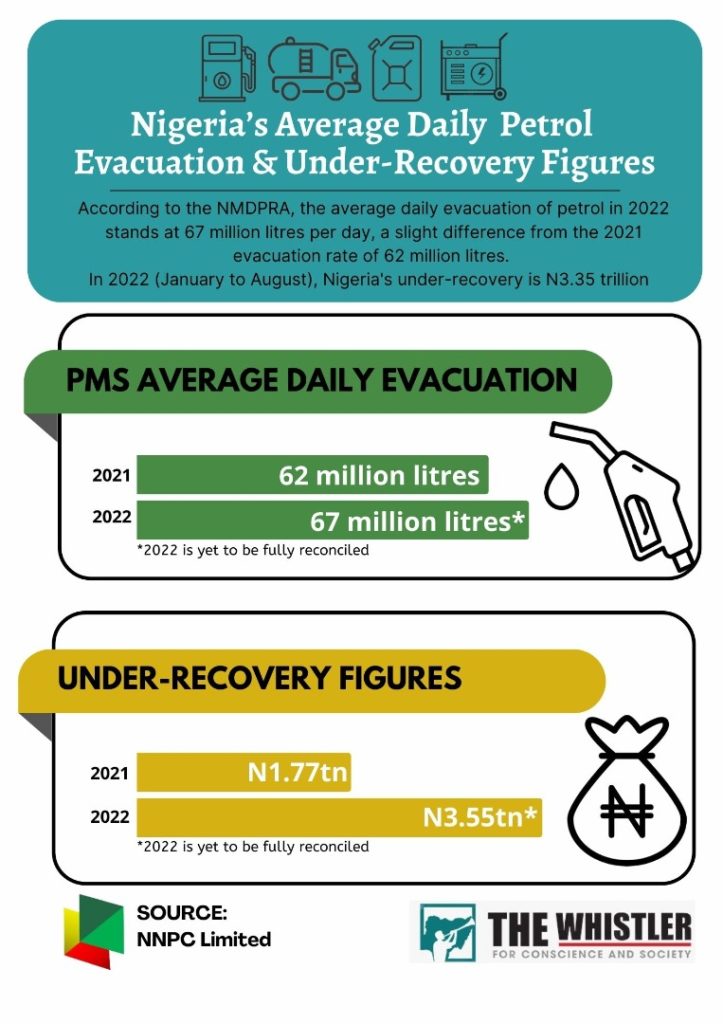Facts have emerged as to how the Nigerian National Petroleum Company Limited, in playing it’s role to guarantee energy security for the country supplied Nigerians with a total of 38.81 billion litres of Premium Motor Spirit popularly known as petrol in 20 months.
Details of the PMS supply to Nigerians which covered January 2021 to August 2022 was obtained by THE WHISTLER on Sunday.
Advertisement
The NNPC has remained the supplier of last resort with a mandate to guarantee National energy security.
To meet the energy requirements l the country, the NNPC Ltd emplaced the crude oil for product swap arrangement which entails value-for-value crude oil swap for product delivery.
Analysis of the petrol supply data showed that out of the 38.81 billion litres of PMS imported into the country, 22.35 billion litres were supplied in 2021 giving an average daily supply of 61 million litres.
Advertisement
For the first eight months of this year, the data revealed that 16.46 billion litres were imported into the country. This translates into a daily average consumption of 68 million litres of petrol.
This is just as the under-recovery recorded by the NNPC for PMS importation was put at N5.12trn.
A breakdown of the N5.12trn showed that in 2021, during the period of low crude oil price as a result of the COVID-19 pandemic, the sum of N1.77trn was recorded as under-recovery or subsidy while the balance of N3.35trn was recorded in the first eight months of this year.
The N3.35trn actual under-recovery for the first eight months of this year could be attributed to many factors such as the return to normal activity level post COVID-19, increase in exchange rate, and rise in product landing costs due to the negative impact of the war between Russia and Ukraine.
Advertisement

Based on analysis of the data, the volume of crude oil imported into the country and the amount recorded as under-recovery followed have been following similar trend
For instance, in the Month of January last year, the NNPC imported 1.68 billion litres of petrol and recorded actual under-recovery of N34bn.
In February, March and April of last year, the importation of crude oil rose to 1.88 billion, 1.91 billion and 2.23 billion litres respectively, with under-recovery following similar upward trend of N61bn, N120bn and N149bn respectively.
In the month of May, crude oil importation dropped to 1.55 billion litres, before rising again in June and July to 1.94 billion litres, 1.99 billion litres and then dropped again to 1.73 billion litres and 1.52 billion litres in August and September respectively.
In the same period, the amount recorded as under-recovery followed the same pattern from N103bn in May to N143bn and N172bn in June and July before dropping to N149bn and N124bn in
August and September of last year.
Advertisement
For October, November and December last year, the National Oil Company supplied Nigerians with 1.60 billion litres, 2.41 billion litres and 1.90 billion litres of petrol, while incurring N182bn, N321bn and N208bn as under-recovery during the period under review.
For the current year, the NNPC imported 1.81 billion litres of PMS into the country with about N195bn incurred as subsidy during the process.
In February, March, April and May, 1.79 billion, 2.69 billion, 2.98 billion and 1.44 billion litres of petrol were imported with subsidy put at N243bn, N566bn, N533bn and N357bn respectively.
For the months of June, 1.74 billion litres of PMS was imported with under recovery of N506bn while July and August saw the National Oil Company importing 2.27 billion and 1.74 billion litres of PMS with under-recovery of N586bn and N362bn respectively.
Further analysis indicated that peak period evacuations from the depot occurred on Fridays due to the anticipation of low or no activity in some depots over the weekend for maintenance and other purposes.
Conversely, the lowest evacuation periods are usually during the weekends, especially on Sundays.
Overall, as a result of the evacuation pattern in the month of August 2022, the average daily evacuation was 66.9 million litres per day, according to the figures.
What this means is that for a simple computation of annual subsidy estimate, even if daily evacuation was estimated to drop to 60 million litres per day, year 2023 subsidy would be a minimum of N6.37trn.
As regards the subsidy amount proposed in 2023 budget by the responsible authorities, experts have said that validating the estimate is ordinarily a very simple arithmetic, because international prices of crude oil and products are well known and accessible by all interested parties including the Nigerian Customs.
For instance, the gasoline price in Europe being the primary sourcing location for Nigerian deliveries averaged $1,230 metric tonnes free on board price, while freight averaged $53 metric tonnes.
What this means is that Cost, Insurance and Frieght for Lagos cost will be $1,283/MT which at the N435 per dollar 2023 budget foreign exchange assumption would translate to N416/litre based on metric ton to litre conversion factor of 1341 as sighted on the approved PMS template.
Based on this global price realities, even if all other cost from offshore Lagos to retail station is N40 per litre, the subsidy per litre is a minimum of N291 per litre.
Furthermore, due to the fact that the federal government strives to ensure uniform prices and pays bridging cost, the NNPC Limited cannot be held liable for efforts aimed at alleviating the economic crunch on citizens.
The NNPC has consistently highlighted the impact of PMS subsidy on Federation revenues profile and its effect on Government ability to fund more impactful projects like education, health and infrastructure.
Various senior government officials have acknowledged that smuggling plays a factor in the cost of subsidy and by implication the daily consumption of PMS in the country.



